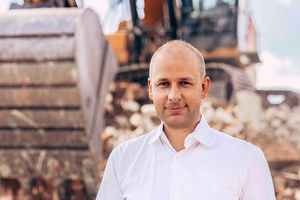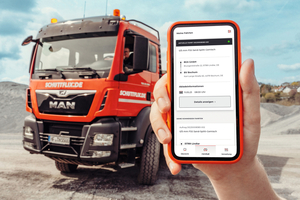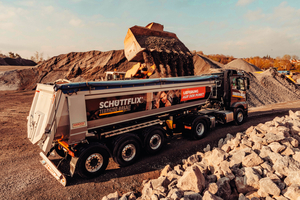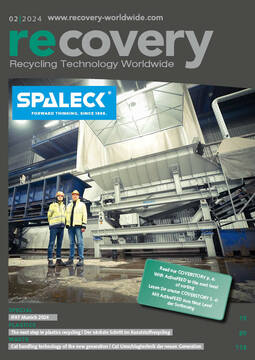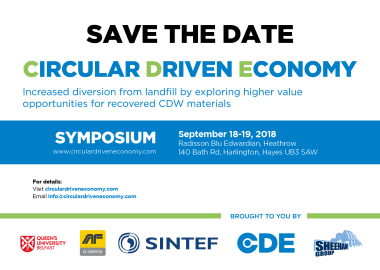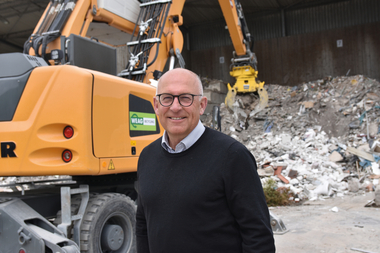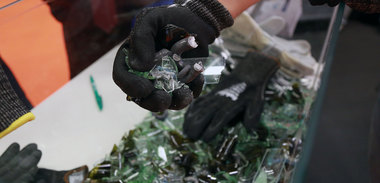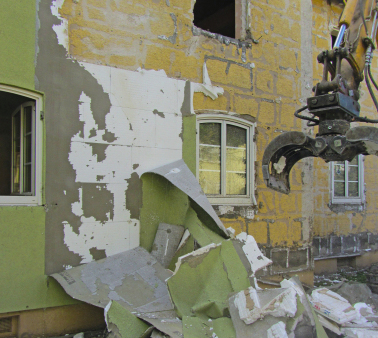Interview with Christian Hülsewig
Digitizing the construction and recycling industries and making them greener, simpler and more efficient in the process – the German ScaleUp Schüttflix was launched in 2018 to achieve nothing less than these goals. Schüttflix is one of the first digital logistics hubs for materials management, both in terms of primary and secondary raw materials and recyclables.
The platform connects building contractors, building material suppliers, waste disposal companies and freight forwarders. With just a few clicks, contractors can compare prices in the app and order or dispose of bulk materials and transports directly. Instead of being regionally fragmented and non-transparent, Schüttflix creates a functioning, efficient market for all common bulk materials in Germany, Austria, Poland and the Czech Republic for the first time.
Schüttflix enables its partner freight forwarders to optimize route planning, which leads to fewer empty runs and therefore greater sustainability. In addition, Schüttflix supports construction companies in optimizing and digitizing their processes with data for real-time analysis and digital documents (invoices, delivery bills, weighing documents). By linking demolition and disposal companies and the associated recycling material, Schüttflix creates a real lever for a more circular economy and intelligent material flow management.
The company generated sales of around € 125 million in 2023 and currently has over 13 000 customers and partners on the platform.
In an interview with recovery – Recycling Technology Worldwide, CEO and co-founder Christian Hülsewig talks about the challenges facing the industry and the opportunities presented by digitalization and genuine value chains.
Schüttflix is still a young but very agile company. What new developments has your company launched in the last 12 months?
Since January 2023, we have been offering the fully systematic disposal of construction and demolition waste in addition to the supply of bulk materials to construction sites. Since then, waste producers have been able to manage their disposal processes independently and digitally via the Schüttflix app. Since last year, we have also been using artificial intelligence to better link our analog and digital processes. The AI enables us to automatically integrate conventionally printed weighing slips into the Schüttflix platform via an OCR (Optical Character Recognition) application. With the image-to-text application, the truck driver only has to select the scan function in the Schüttflix app with his cell phone after weighing at the producer and photograph the weighing slip. All relevant information, figures and data are automatically read out and digitized. This means the customer can see everything in real time at all times.
Where does Schüttflix come into play in the circular economy, especially with regard to waste/material recycling?
Schüttflix takes a holistic approach to construction sites – both during construction and dismantling. Thanks to our business principle of supply and disposal, we are able to manage the entire material flow cycle of a construction site in a way that conserves resources. We examine and process both mineral and non-mineral waste. This allows us to reuse the products where they are needed. A true circular economy.
Which non-mineral waste streams are fed back into the material cycle as secondary raw materials by Schüttflix?
All mineral and non-mineral raw materials that accumulate on the construction site are carefully checked by us and our experts and returned to the cycle or disposed of accordingly. This also includes materials such as wood, plaster or KMF wool, some of which can be reused and thus contribute to resource-conserving construction methods. Schüttflix provides comprehensive support for dismantling projects in order to return as much material as possible to the cycle – and thus counteract the high consumption of resources in the construction industry.
To what extent does Schüttflix intervene
in the processing of secondary materials?
Can the materials offered by Schüttflix also be shredded or sorted?
We offer the entire value chain with the help of our network. The use of mobile crushing plants is also possible through us, although this is often only worthwhile for larger construction sites with high volumes, as the Substitute Building Materials Ordinance has created significantly more difficult processes here. We take smaller volumes to our partners‘ recycling centers and process them on site.
How do you see the future direction/development of Schüttflix in the market
with regard to non-mineral recyclables?
We are focusing entirely on the needs of our customers and on a resource-conserving construction industry. According to the Federal Environment Agency, the majority of all waste in Germany comes from the construction and demolition industry. Even though the proportion of non-mineral building materials used in demolition is low in percentage terms, we want to make our contribution here too and offer our customers the solution they need.
How do you see the future development of Schüttflix on the one hand and the construction materials industry in general on the other?
Schüttflix has set out to digitalize the construction industry across Europe, make it more efficient and significantly greener. We have already achieved this very successfully in parts and we are proud of this. We are now focusing on the circular economy and reducing emissions as we continue to develop our business area. Our concept – combining supply and disposal – forms the ideal basis for this.
The construction industry is currently facing considerable challenges due to the change in interest rate policy, particularly in residential construction. Only falling interest rates or other subsidy programs can help. We are focusing on infrastructure issues such as road construction, rail and our energy transition, so there is more than enough for us to do even in this interest rate environment.
What would you like to see from politicians in order to really implement the circular economy in the building materials industry?
Building materials that leave the construction site are not automatically waste! A large proportion can now be processed and reused as RCL. You could say that demolition is the ballast plant of the future! Last year, the new Substitute Building Materials Ordinance caused a lot of misunderstanding in the industry, especially at recycling centers, because it made on-site processing on construction sites much more difficult.
In addition, digitalization and the circular economy should not only be discussed and decided in Berlin, but also implemented nationwide. In reality, paper and natural stone evidence is still all too often required when awarding public contracts, particularly at municipal level. A rethink is urgently needed here.

